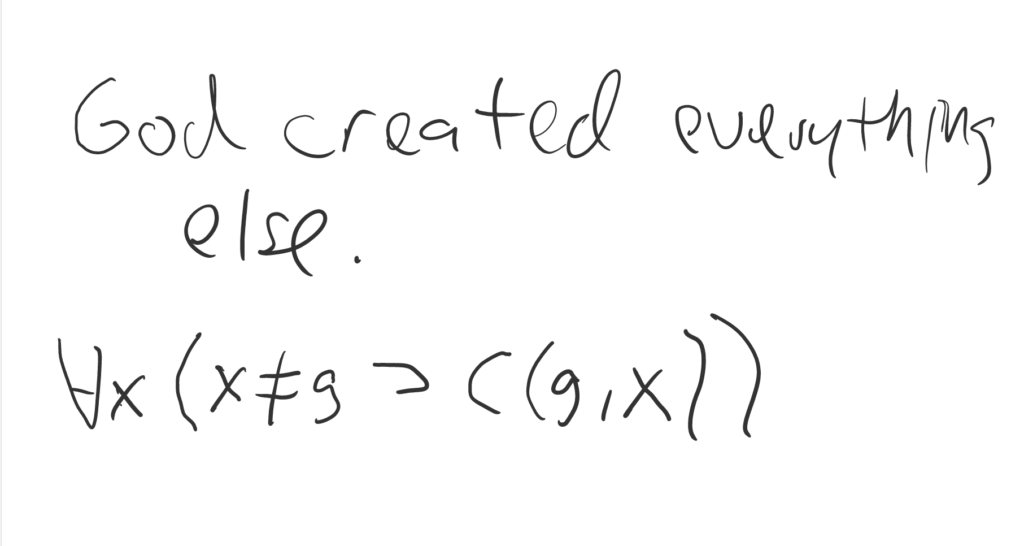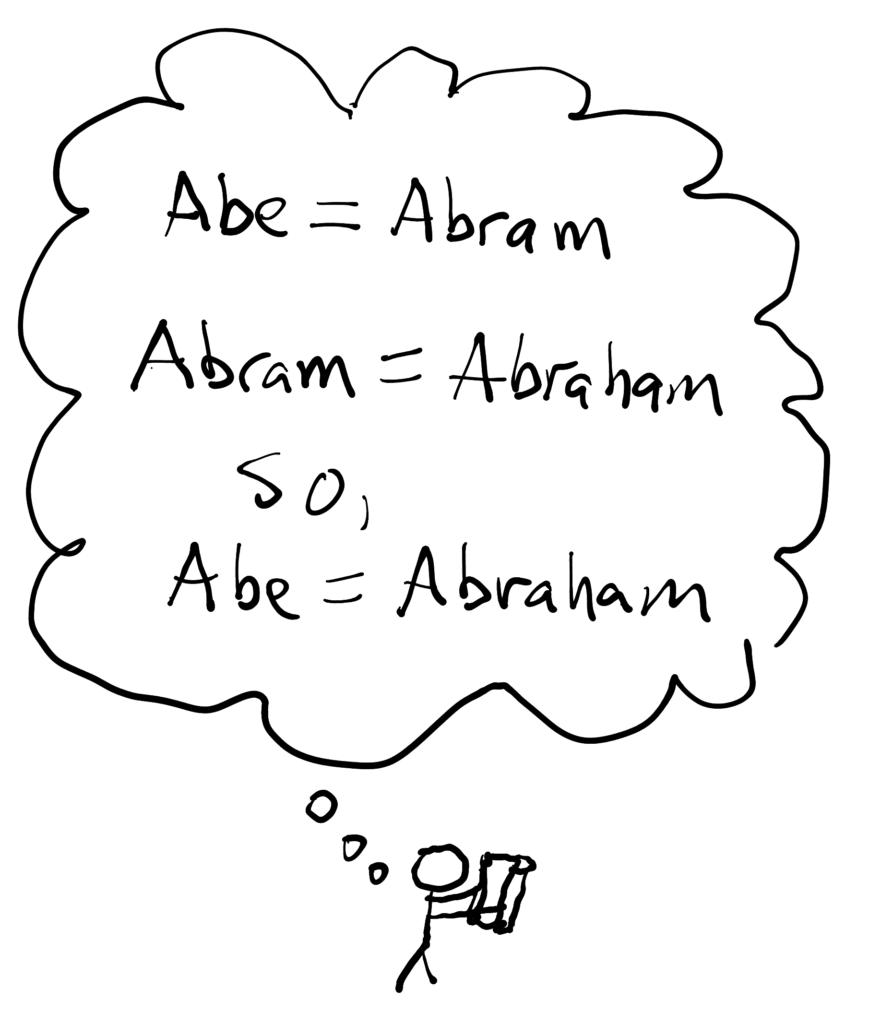Podcast: Play in new window | Download
Subscribe: Spotify | Email | RSS

In this second part (part 1 here) you’ll hear the mutual interrogation portion of the EPS session on book One God, Three Persons, Four Views, with plenty of commentary by me and some extra relevant audio. This portion of the session contains a number of interesting exchanges. Among them:
- Hasker (via McIntosh) asks me whether my views entail that God’s spirit has failed to lead the Church into all truth (John 16:13).
- Branson asks Craig how, if most ancient people lacked the concept of numerical identity, they were able to count.
- Branson asks me how many saviors (or “saviors”) I think there are.
- Craig asks me how I could totally miss his point in the book.
- Craig asks Branson if Branson is committed to the controversial thesis of numerical sameness without identity.
- I ask Craig how he can talk about a tripersonal god while also saying that “the Trinity” is a plural referring term, not referring to any one, individual thing.
- I ask Craig how he could possibly show that Jesus “is God” is the second-highest use of the term “God,” where it doesn’t imply being a god.
- I ask Branson whether creedal orthodoxy, rightly understood, rules in or rules out people who identify the only god with the Trinity (i.e. the triune god).
Craig urges, as he did in part 1, that most ancient people either lacked a concept of numerical identity (represented in modern logics by the symbol =) or at least that they did not have a modern grasp of that concept, so that they could explain it like this. You will hear in this episode how he came to this conviction. In his view this is a simple argument by which to show that any unitarian interpretation of the New Testament (i.e. any one on which the authors hold that the unique God and the Father are one and the same), is an historical anachronism, and so needn’t be taken seriously.
I push back both in the session and in the commentary here, urging via a thought-experiment and via examination of a couple of New Testament passages (John 7:41-42 and Luke 24:13-35), that ordinary ancient people did have a concept of same-thing-as or numerical identity. I also show, using some additional conference audio, that Craig is committed to their having that concept by the view he attributes to the authors of Scripture and to the Pre-Nicene “fathers” that God is the creator of absolutely everything else.

Links for this episode:
Reasonable Faith podcast episode: Dr. Craig’s Health Update
Tuggy, “Antiunitarian Arguments from Divine Perfection“
podcast 248 – How Trinity theories conflict with the Bible
McIntosh review of Craig, God Over All and Craig, God and Abstract Objects (website)
Craig, Cadbury Lectures: “God Over All” (2015) playlist
This week’s thinking music is “Cardboard Engineering” by Jesse Spillane.


Thanks Dale for your input, i totally agree with you
I was shocked to hear that WLC thinks this “revelation” really constitute “a dagger in the heart of Unitarianism”. To me, that’s like saying the ancients didn’t know about gravity because Newton was the first in expressing the law. Surely the ancient knew that if they threw a ball, that would fall even if they didn’t have the insights and understanding and jargon that Newton brought to the table.
I asked my wife: “Honey, do you know the law of “indiscernibility of identicals”. She told me: “mmmm nope”. But do you think the ancients would have understood the following logic… (I explained a simple notion of identity like your “Abe”, “Abram” and “Abraham”) and she told me: “Yeah, obviously, everybody intuitively understands basic notions like that even if they like the logician’s terminology”.
The fact that WLC has to appeal to things like these, shows how desperate the defense of the trinity is
Blessings brother! Thanks for your job and your effort in putting serious Unitarian thinking in the radar
Dale, let’s say that Craig is correct, just for the sake of argument, that the ancients didn’t have a modern understanding of identity and therefore wouldn’t have perceived a problem with the notion that three persons comprise one being. How does that in any way resolve the problems that those WITH a modern understanding of identity perceive? It seems to me that, even if true, all his “realization” would potentially imply is that the NT writers wouldn’t have perceived the difficulties, but that wouldn’t necessarily mean that the difficulties that those with a modern understanding of identity perceive are invalid. The NT writers may not have had a problem with the notion that the earth is flat, but that doesn’t mean that the earth is flat.
I’m not clear why Dr. Craig’s bare bones definition is not just polytheism. Three persons on a team make one team, but the one team is not a separate person or a super soul. Baal, Anath, and Asherah can be one pagan pantheon, but they don’t make a single deity. Being one nature or one group does not make them a super self, and Dr. Craig does not even seem to claim that, even though he calls each person part of a three-soul something. How does his definition escape polytheism if his group is not the one God?
Hi Rob – your question is a good one. Now that he’s re-thought “the Trinity” his views are NOT easy to understand! Usually trinitarians use “the Trinity” as a singular referring term for the triune God. But Craig now uses “the Trinity” as a plural referring term for the Persons. BUT he also believes in a triune God – he just doesn’t call it “the Trinity”! In his (beyond minimal) theory, such as it is, God just is a certain soul which has three sets of cognitive faculties that somehow or other make it (eternally) sprout three Persons (seemingly selves). Now, is this one God (the soul) a self? Craig almost always talks like he thinks it is. But if pressed, he’ll say it “is” three Persons or “tripersonal” – almost like he thinks this entails being a self but is greater. But just because something somehow supports or gives rise to three (second-tier) divine Persons, it doesn’t follow that it is a Person. Anyway, no, I don’t think it is tritheism, as he has exactly one God (this “soul”) in the account. If you say: but you also have three fully divine Persons, and what is a fully divine Person if not a God – then he has a built-in answer. Like Hasker, Craig is committed to two kinds of deity/divinity: the god-kind, which only that soul has, and a divine-Person divinity, which only the Persons have. In short, none of the Persons is *fully* divine or divine in the highest sense – non has god-divinity. In this way he contradicts creedal orthodoxy in his attempt to have a coherent theology. And also, he contradicts the NT, which teaches that the Father just is the one God, as so is fully divine, or divine in the way the only god is.
Hi Dale , at around 1.15.50 you mentioned you thought that both Craig and yourself may have nervously laughed after realizing that your immediately previous interchange touched upon the prior discussion regarding whether (any -or modern) concept of identity was understood by the ancients which you both disagreed about in the prior session. That maybe true, however Craig had a much more telling reason to laugh nervously, because in his recounting of his study of the ante-Nicene Father’s (1.13.00-1.13.30) he related their use of agennetos (un-originate/uncreated – Craigs definition) to exclude all else, other than God only, stating these Fathers Strongly asserted only God was agennetos (=uncreated) AND as it related to the Trinity, only the Father was agennetos but the Son gennetos in the sense of begotten (=generated / originated / created?!) Surely, when this Freudian slip left his mouth Craig would have had reason to nervously laugh since his prior discussion means the Son is different than the only one identified as the only uncreated being and God.
Doesn’t Craig’s position also entail that anti-modalism is an anachronism? If the ancients lacked the concept of numerical identity, then they had no concept of Jesus being distinct from the Father and the Holy Spirit. I think a better version of a Craigian thesis would be to say that although they had the concept, it wasn’t as central to their concept of “sameness” or “oneness” as it is to the modern mind. But I suppose that errs too much in a Bransonian direction perhaps.
Comments are closed.